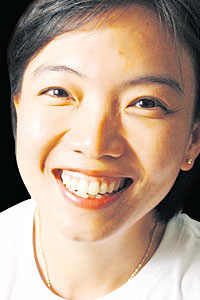Yangon International Airport is being expanded. The current facility has exceeded its passenger handling capacity of 2.7 million and is expected to reach 5 million by the end of the year. The number of international visitors has also skyrocketed after Myanmar opened up its country a couple of years ago. A new four-lane motorway will soon be constructed in Yangon, alongside two new ring-roads around the city to ease traffic.
I revisited the old capital of Myanmar during the general election at the beginning of last month after my first visit in April 2012 when the by-elections were held, paving the way for Aung San Suu Kyi to become a member of parliament.
At that time, the internet connection was really bad. Sending one picture back to Bangkok took more than half an hour.
But this time, I could upload a time-lapse video clip to my Facebook page in less than a minute, chat over Line with my family and watch NBA highlights with no connection interruptions. These are signs of communication improvements.
Mobile phones that were once expensive -- a SIM card cost US$250 (about 9,000 baht) in 2013 -- are now much more affordable. In that year, about 13% of the population had mobile phones, according to World Bank development indicators. But the latest statistic from the Ministry of Communications and Information Technology showed 28.1 million SIMs have been sold as of March this year, representing a penetration rate of 54.6% of its population. This is thanks to Qatar's Ooredoo, which started providing 3G SIM cards at only $1.50 in August last year, followed closely by the Norwegian Telenor company, which started its service in September 2014. Although Myanmar Post and Telecommunication has the biggest market share so far, subscribers of both foreign providers keep increasing.
Smartphones are also cheaper. I saw several street stalls selling second-hand smartphones, some with shattered screens. On the evening of election day on Nov 8, supporters of National League for Democracy (NLD) gathered in front of the party office until they almost closed traffic on the six-lane street. When I looked around, I saw lots of smartphone screen lights. Many phones displayed NLD flags on the screens, some showed the picture of Suu Kyi with the sentence "We are the winners" in yellow against the red colour screen, the colours of the party.
It reminded me of the evening of the by-elections on April 1 three years ago when thousands of supporters showed up in front of the NLD office with hopes to see and hear the speech of the party leader, almost everyone holding small NLD flags in their hands. This year, however, there were more supporters holding smartphones displaying the digital flag. They waved their smartphones while dancing to the music. The ambience on the night of Nov 8 was like being at a concert.
Lots of foreign investment has poured into the Myanmar hotel sector. According to the Ministry of Hotels and Tourism, investment doubled from $1.14 billion in 2011 to $2.64 billion this September. Singapore topped the list of investors, followed by Vietnam, Thailand, Hong Kong, Japan and Malaysia.
During my last visit, the Myanmar-run hotel I had stayed in previously was closed for renovation. I stayed in a US-chain hotel, which had been open in Chinatown for six months. The benefits of these Western-chain hotels for customers like me is that I can expect a certain level of service, facilities and cleanliness of room. More five-star hotels have been launched. The opening of more international hotels in Myanmar is also a sign that hospitality service standards are getting better. In addition to the new hotels, tall and modern-looking buildings have been newly built as office spaces, condominiums and shopping malls. There is also a billboard sign in Japanese, with an address of its condominium sale offices located in both Yangon and in Japan, as Japan is one of the big investors in Myanmar with a total investment of about $565 million, according to the Myanmar Investment Commission. The major investment is in the Thilawa Special Economic Zone in Yangon as well as the new motorway in the city.
Masaharu Nakagawa, the head of a Japanese observer delegation and member of parliament, told me on the day before the general election that Japan would invest more in Myanmar if the process of democratisation gains pace. Certainly the country is gearing toward democracy.
But through all of these development signs, one out of many issues that urgently needs attention from the new government is the country's poor hygiene standards. Locals always throw litter on streets, in waterways or in public spaces, like the floor of a train wagon, as if it is common practice. They also spit.
As Myanmar people pin their hopes on the new government and expect change for a better life under Aung San Suu Kyi, they too can do things to bring about change. Starting with little things, for example, by putting trash in garbage bins.
Karnjana Karnjanatawe is a travel writer of the Life section of the Bangkok Post.
